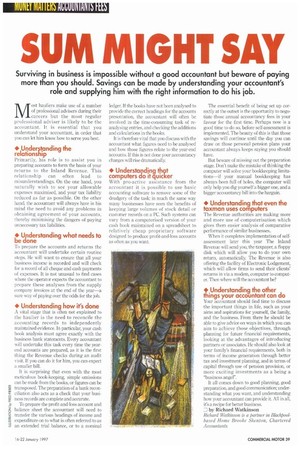SUM MIGHT SAY
Page 51

If you've noticed an error in this article please click here to report it so we can fix it.
Surviving in business is impossible without a good accountant but beware of paying more than you should. Savings can be made by understanding your accountant's role and supplying him with the right information to do his job.
A4ost hauliers make use of a number of professional advisers during their careers but the most regular professional adviser is likely to be the accountant. It is essential that you understand your accountant, in order that you can let him know how to serve you best.
• Underganding the relationship
Primarily, his role is to assist you in preparing accounts to form the basis of your returns to the Inland Revenue. This relationship can often lead . to misunderstandings. On the one hand, you naturally wish to see your allowable expenses maximised, and your tax liability reduced as far as possible. On the other hand, the accountant will always have in his mind the need to avoid any problems in obtaining agreement of your accounts, thereby minimising the dangers of paying unnecessary tax liabilities.
• Understanding what needs to be done
To prepare the accounts and returns the accountant will undertake certain routine steps. He will want to ensure that all your business income is recorded and will check for a record of all cheque and cash payments of expenses. It is not unusual to find cases where the operator expects the accountant to prepare these analyses from the supply company invoices at the end of the year—a sure way of paying over the odds for the job.
• Understanding how it's done
A vital stage that is often not explained to the haulier is the need to reconcile the accounting records to independently maintained evidence. In particular, your cash book analysis must agree exactly with the business bank statements. Every accountant will undertake this task every time the yearend accounts are prepared, as it is the first thing the Revenue checks during an audit visit. If you can do it for him, you can expect a smaller bill.
It is surprising that even with the most meticulous book-keeping, simple omissions can be made from the books, or figures can be transposed. The preparation of a bank reconciliation also acts as a check that your business records are complete and accurate.
To prepare the profit-and-loss account and balance sheet the accountant will need to transfer the various headings of income and expenditure on to what is often referred to as an extended trial balance, or to a nominal ledger. If the books have not been analysed to provide the correct headings for the accounts presentation, the accountant will often be involved in the time-consuming task of reanalysing entries, and checking the additions and calculations in the books,
It is therefore vital that you discuss with the accountant what figures need to be analysed and how those figures relate to the year-end accounts. If this is not done your accountancy charges will rise dramatically.
• Understanding Nit computers do it quicker
With pro-active assistance from the accountant it is possible to use basic accounting software to remove some of the drudgery of the task: in much the same way many businesses have seen the benefits of keeping large volumes of stock detail or customer records on a PC. Such systems can vary from a computerised version of your cash book maintained on a spreadsheet to relatively cheap proprietary software designed to produce profit-and-loss accounts as often as you want. The essential benefit of being set up correctly at the outset is the opportunity to negotiate those annual accountancy fees in your favour for the first time. Perhaps now is a good time to do so, before self-assessment is implemented. The beauty of this is that those savings will continue until the day you can draw on those personal pension plans your accountant always keeps saying you should have.
But beware of missing out the preparation stage. Don't make the mistake of thinking the computer will solve your bookkeeping limitations—if your manual bookkeeping has always been full of holes, the computer will only help you dig yourself a bigger one, and a bigger accountancy bill into the bargain.
• Understanding that even the taxman uses computers
The Revenue authorities are making more and more use of computerisation which gives them easier analysis of comparative performance of similar businesses..
When it completes implementation of selfassessment later this year The Inland Revenue will send you, the taxpayer, a floppy disk which will allow you to do your own return, automatically. The Revenue is also offering the facility of Electronic Lodgement, which will allow firms to send their clients' returns in via a modem, computer to computer. Then where will the accountant be?
tUnderstanding the other things your accountant can do
Your accountant should find time to discuss the important things in life, such as your aims and aspirations for yourself, the family, and the business. From there he should be able to give advice on ways in which you can aim to achieve those objectives, through planning for future financial requirements, looking at the advantages of introducing partners or associates. He should also look at your family's financial requirements, both in terms of income generation through better tax and investment planning, and in terms of capital through use of pension provision, or more exciting investments as a being a "business angel".
It all comes down to good planning, good preparation, and good communication; understanding what you want, and understanding how your accountant can provide it. Al] in all, it's a recipe for better business.
by Richard Watkinson
Richard Watkin.son is a partner in Blackpoolbased Horne Brooke Shenton, Chartered Accountants












































































































